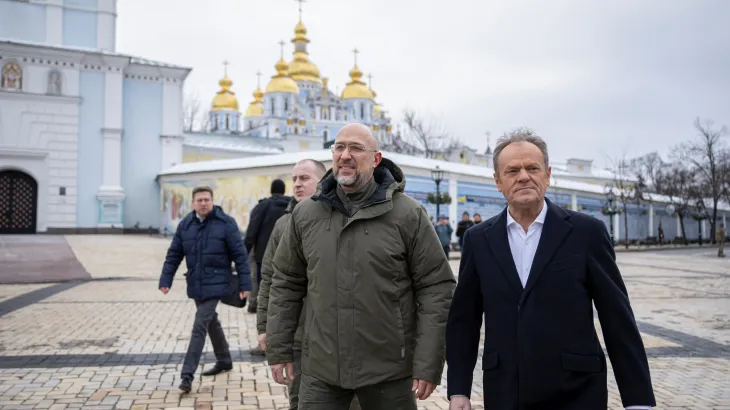Diplomatic Twists And Turns: Polish Support For Ukraine Shifts
Poland threw its full weight behind Ukraine after Russia’s invasion two years ago. Now, relations are more vulnerable.
On the first anniversary of Russia’s invasion of Ukraine last February, Poland’s Prime Minister Mateusz Morawiecki paid a surprise visit to Kyiv.
Standing next to Volodymyr Zelenskyy in a khaki jacket to match the Ukrainian president’s wartime style, he brought with him the first delivery of Leopard tanks, a solidarity gesture worthy of a good neighbour.
However, as the war enters a third year, relations between Ukraine and Poland remain tense as the allies’ divergent economic interests have come to the fore.
No one expects grandiose expressions of support.
Instead, the February 24 anniversary will take place amid prolonged protests at the Poland-Ukraine border by Polish farmers who say the market has been flooded with cheap agricultural products from Ukraine.
“Week after week, Poland is killing Ukraine’s European future,” the European Pravda, one of Ukraine’s most news outlets, wrote in January.
After Russia invaded Ukraine on February 24, 2022, Poland welcomed more than a million Ukrainian refugees who crossed the border without documents and immediately accessed social benefits. Warsaw also supplied Kyiv with Soviet-era military equipment it had left in its reserves and flourished into Ukraine’s staunchest advocate among Western nations.
Morawiecki was part of the first foreign delegation to visit Kyiv after the invasion, while Poland’s President Andrzej Duda reportedly had a direct line with Zelenskyy in the first months of the war.
Poland was also the leader of the European initiative. Initially opposed by Germany, it went on to provide Ukraine with the Leopard tanks.
It seemed as though the Poland-Ukraine tandem, united by strong anti-Russian sentiment, was there to stay.
The End Of The Honeymoon
According to Poland at War, a new book by Polish reporter Zbigniew Parafianowicz based on interviews with officials and decision-makers, relations between the two countries began to deteriorate when a Ukrainian stray missile fell on Poland’s eastern town of Przewodow, killing two.
Despite all the evidence to the contrary, Zelenskyy insisted that the missile was Russian, which sowed the first seeds of distrust between the allies, the author suggests.
The dispute rattling Polish farmers on the import of Ukrainian grain has also dampened ties.
In May 2023, Poland, along with other Central European states, banned imports citing protection of the interests of local farmers, a move cast by Ukraine as a stab in the back.
In response, at the United Nations General Assembly in September, Zelenskyy accused Poland of helping Moscow’s cause.
“It was an insult not only to (the governing Law and Justice PiS leader Jaroslaw) Kaczyński and PiS, but to the Polish political class, and the Polish political leadership that has supported Ukraine unconditionally,” Parafianowicz told Al Jazeera.
But Gerasymchuk remained optimistic.
For him, Poland, along with Lithuania, is still Ukraine’s most loyal ally.
“The European Union is not only about realms where we are all on the same page, but also about economics where we may have different interests,” he said.
“Notwithstanding different interests, however, I do hope that the common threat that exists in the northeast will hold all Central Europe together.”
ALJAZEERA




Comments are closed.